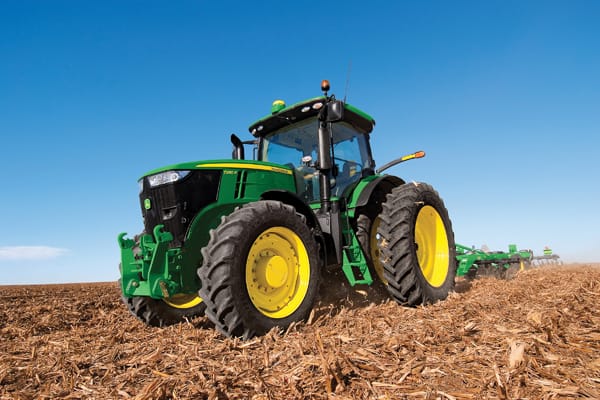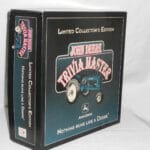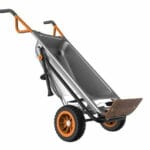Join us on an exciting adventure as we explore the world of John Deere, a name synonymous with innovation and agricultural excellence. Delve into the fascinating story of his life, unravel the secrets of his inventions, and discover how he transformed the face of farming forever. With captivating facts and engaging storytelling, we’ll embark on a journey that will leave you amazed by the impact of this legendary figure on the world of agriculture.
Facts About John Deere
John Deere: the name probably brings to mind those big green tractors you see rumbling across farm fields. But did you know the story of John Deere actually starts way back in 1837 with a simple, yet revolutionary invention: the self-scouring steel plow?
Back then, farmers in the Midwest struggled with the thick, sticky soil. Their cast iron plows would get gummed up, making planting a nightmare. Deere, a blacksmith by trade, had a hunch that a plow made from polished steel would slide right through the soil, and he was right!
This new plow was a game-changer, allowing farmers to finally work their land efficiently. Word of Deere’s invention spread like wildfire. But it wasn’t just the invention itself that made a difference. Deere was dedicated to building products to last and treating his customers right. This commitment to quality and customer service formed the bedrock of the John Deere company we know today.
But Deere’s legacy goes beyond tractors and plows. His values of hard work, honesty, and always putting the customer first are still at the heart of the company. It’s one of the reasons why John Deere is more than just a brand; it’s a symbol of reliability and excellence in the agricultural world.
Deere’s blacksmithing background definitely played a big part in his success. He understood metal and its properties and wasn’t afraid to experiment. That spirit of innovation didn’t die with John Deere. The company he founded continues to push the boundaries of agricultural technology, always searching for new and better ways to help farmers feed the world. Talk about a lasting impact!
John Deere’s story is a testament to the power of a simple, yet ingenious solution to a real-world problem. It highlights how dedication to quality and customer satisfaction can transform a small business into a global giant. And most importantly, it reminds us that even today, the values of a single individual can continue to shape an entire industry.
What are three facts about John Deere?
We’ve already talked a bit about John Deere, but let’s dive into some lesser-known facts about this company that’s practically synonymous with farming.
- John Deere’s very first plow was a total game-changer. Deere’s plow, with its clever design, sliced right through the thick, heavy soil that plagued Midwestern farmers, completely changing the game and making large-scale farming possible.
- It’s a family affair! John Deere’s son, Charles, took over in 1858 and steered the company through tough economic times, always innovating and expanding their reach. Talk about a legacy!
- John Deere has released an unbelievable 690 tractor models since 1837! That’s not just a lot of tractors; it shows their dedication to coming up with new ideas and giving farmers around the world the tools they need.
It’s pretty amazing to think about how one company has had such a massive impact on how we grow our food. John Deere’s story is a testament to the power of innovation and a reminder that sometimes, all it takes is a better plow to change the world.
What was John Deere best known for?
John Deere wasn’t just a name on a green and yellow tractor. He revolutionized farming. Imagine back in the 1830s, farmers struggled with clunky iron plows that couldn’t handle the thick soil of the Midwest. Then, in 1837, Deere, a blacksmith by trade, designed a game-changer: the self-scouring steel plow. This invention wasn’t just a plow; it was a beacon of hope. It sliced through the tough soil like butter, boosting efficiency and opening up vast tracts of land for cultivation. It was a defining moment that transformed the American agricultural landscape.
But Deere didn’t stop there. He understood that farming was ever-evolving, and so was the need for innovative equipment. Over time, his company, Deere & Company, branched out, adding more tools to its lineup.
Think beyond those iconic green tractors. Deere dove into residential lawn mowers, keeping lawns tidy across America. Golf courses and sports fields benefited from their specialized turf maintenance equipment, ensuring pristine playing surfaces. Then there were the Gators and UTVs, rugged workhorses designed to tackle tough terrain. And let’s not forget their foray into heavy-duty equipment for construction and forestry.
What fueled this expansion? Deere’s unwavering belief in innovation and his deep commitment to making farming easier and more productive. This dedication to progress is a legacy that continues today. Deere & Company remains at the forefront of agricultural technology, consistently pushing the boundaries with cutting-edge machinery and data-driven solutions.
John Deere’s story is a testament to the power of ingenuity and entrepreneurial spirit. He saw a problem, rolled up his sleeves, and invented a solution that not only addressed the immediate need but also laid the foundation for an agricultural empire that has flourished for generations.
What is John Deere’s date of death?
John Deere died on May 17, 1886. 1886 was an interesting year. The Statue of Liberty was being erected in New York Harbor, and Coca-Cola was invented just a year earlier. It was a time of big changes and new inventions, much like the era John Deere himself had helped shape.
While John Deere may be gone, his legacy lives on. His company, Deere & Company, is still going strong today, making all kinds of farming and construction equipment. You could say that his innovative spirit, the kind that led him to design that revolutionary plow, is still alive and well in the company he built.
What are some facts about John Deere’s steel plow?
Let’s explore what made John Deere’s steel plow such a big deal. It wasn’t just a shiny new tool; it completely changed the game for farmers, especially in the Midwest.
Before Deere, farmers struggled with plows made of cast iron or wood that would get jammed up in the thick, sticky soil. Deere’s plow, on the other hand, sliced through that tough soil like butter thanks to its sturdy steel construction. And the “self-scouring” design meant the soil wouldn’t stick to it. This was huge because it meant farmers could plow for hours without having to stop and clean the blade every few minutes.
It wasn’t just easier on the farmers, it was easier on their animals too. The steel Deere used was surprisingly light, so plows were less of a burden for the horses or oxen pulling them. This meant they could work longer and cover more ground without getting worn out.
But the impact of Deere’s plow goes way beyond just making life easier for farmers. It essentially kick-started the mechanization of agriculture. Farmers could suddenly cultivate larger areas of land with less effort, leading to bigger harvests and more food for everyone. This, in turn, fueled economic growth and helped shape the agricultural landscape we know today.
Important Note: While John Deere’s steel plow is widely celebrated, it’s important to remember that its widespread adoption also had complex social and environmental impacts. Some historians argue that it contributed to the displacement of Indigenous communities and the intensification of agriculture, which had long-term consequences for land use and ecosystems.
Was John Deere Against Slavery?
We’ve talked about John Deere and his impact on farming. But what about his stance on slavery? It’s a question historians have grappled with, and while there aren’t clear-cut answers, we can look at the evidence.
Some historians suggest that John Deere was likely against slavery, pointing to his involvement in the newly formed Republican party, known for its anti-slavery position. At that time, aligning oneself with a party taking such a firm stance speaks volumes about one’s own beliefs.
Adding to this, there are stories about Deere’s potential involvement with the Underground Railroad. While concrete proof is hard to come by, these stories persist, hinting at Deere’s possible support for the abolitionist cause.
However, it’s important to acknowledge that Deere didn’t leave behind many documents clearly stating his views on slavery. This lack of direct evidence has led some to believe he might have remained neutral on the issue, perhaps focused primarily on his business.
Yet, even if Deere wasn’t publicly outspoken about his opposition, his actions, such as associating with the Republican party, suggest he probably wasn’t comfortable with the institution of slavery.
The debate surrounding John Deere’s stance on slavery reminds us that history isn’t always clear-cut. Sometimes, we’re left with clues and whispers, piecing together the past as best we can. While we might never know for sure what was in Deere’s heart, the evidence we have offers valuable insights into the man behind the plow.
Where is John Deere Buried?
After a life of innovation and dedication to farming, John Deere was laid to rest in Riverside Cemetery in Moline, Illinois. This peaceful cemetery is located near the headquarters of the John Deere Company, which he founded in 1837.
Born in Vermont in 1804, Deere moved to Illinois and saw firsthand the challenges farmers faced with the thick Midwest soil. Their old cast-iron plows just couldn’t handle it! But Deere, a blacksmith by trade, had a stroke of genius. He crafted a plow from polished steel that could slice through the soil like butter, making life a whole lot easier for farmers.
Deere’s plow, with its ability to “scour” the soil, was a revelation. Farmers could work more land with less effort, boosting productivity and changing the face of agriculture.
Deere’s impact went beyond his groundbreaking plow. He was a man of the people, even serving as the mayor of Moline for a time. He understood the importance of community and giving back, supporting various educational and social causes throughout his life.
Today, his gravesite stands as a testament to the respect and admiration people still have for John Deere. It’s a reminder that sometimes, a simple solution can have a lasting impact on the world.
What is the oldest John Deere?
The John Deere story begins in 1837 – long before fancy tractors roamed the fields. Back then, farmers struggled with plows that would get jammed up with sticky mud, slowing them down and making their lives harder.
John Deere, a blacksmith at the time, saw this problem firsthand and came up with a game-changer – the self-scouring steel plow. Instead of using iron, Deere crafted his plow from polished steel. This allowed the soil to slide right off, making plowing smoother and easier.
This simple invention, the very first John Deere product, wasn’t just a better plow; it was a revolution in farming. Deere’s steel plow meant farmers could work faster and more efficiently, ultimately changing the face of agriculture. From those humble beginnings, the John Deere Company we know today was born, and they haven’t stopped innovating since.
What are some interesting facts about the plow?
It’s amazing to think about how something we might take for granted today, like the plow, was actually a game-changer in the past.
The very first plows were simply pointed sticks or blades made of wood. Farmers would hitch these early plows to animals like oxen or horses to till the land.
The introduction of metal plows, made from iron, was a big step up. While heavier than their wooden predecessors, iron plows were undeniably tougher.
But the real revolution came in 1837 with John Deere and the introduction of the very first steel plow. Deere’s plow, with its polished steel moldboard, was incredibly durable and resistant to soil sticking. This invention was a game-changer, making farming more efficient and productive.
For centuries, the plow was the go-to tool for preparing the soil for planting, remaining a staple in farming until tractors began to take over in the early 1900s. Although tractors are more common in industrialized countries today, the plow is definitely not extinct and can still be found hard at work in many parts of the world.
Plows come in all shapes and sizes, designed for specific types of soil and different farming practices. Some are built to break up hardpan, while others are made for making furrows for planting seeds.
Plows are more than just tools for preparing the soil; they’re also used to control weeds and even manage pests. From those early wooden models to the sophisticated plows we have today, this simple tool has played a massive role in shaping agriculture as we know it.
The next time you see a farm or enjoy a meal made with fresh ingredients, take a second to appreciate the humble plow and its incredible journey through history.
What are the benefits of John Deere?
What makes John Deere stand out? What’s the big deal about this green and yellow giant? Let’s dive into the nitty-gritty and see why so many folks swear by John Deere.
Built Like a Tank! John Deere machines are famous for being incredibly durable. They’re built to handle tough conditions year after year, just like the people who use them. This focus on durability means fewer breakdowns, less downtime, and more time getting work done.
Farming Smarter, Not Harder: John Deere is all about working smarter. They’ve been at the forefront of bringing cutting-edge technology to the farm, with GPS guidance systems, precision planting tech, and even automation features. These advancements aren’t just fancy gadgets; they’re about saving farmers money on fuel and inputs, maximizing yields, and making farming more sustainable.
Something for Everyone: John Deere’s product line is massive! They offer a wide variety of equipment, from tractors and combines to specialized equipment for planting, tilling, and baling. And they haven’t forgotten about construction! This variety means they likely have a solution for almost any need, big or small.
Help is Just Around the Corner: John Deere has a massive network of dealerships across the country, staffed with expert mechanics who know their machines inside and out. This means that if something does go wrong, help is usually just a phone call away.
Thinking Green (and Yellow, of Course!): John Deere understands the importance of being environmentally conscious. They’re constantly researching and developing new technologies to make their machines more fuel-efficient and reduce emissions. From using alternative fuels to developing electric tractors, they’re trying to find ways to reduce their impact on the planet.
John Deere’s focus on durability, innovation, a wide range of products, strong customer support, and environmental responsibility makes them a top contender in the world of agriculture and beyond.
What is the history of John Deere for kids?
A long, long time ago, a blacksmith named John Deere invented something that changed farming forever!
Blacksmiths were like superheroes of metal, shaping hot, glowing metal into tools and parts. John Deere wasn’t just any blacksmith; he had a knack for invention!
John Deere lived in a time when farmers were struggling to plant crops in the Midwest. The soil was so tough that regular plows couldn’t handle it. They’d get all clogged up!
John Deere had an idea. He thought that using a different material, something smoother and stronger, might work better. So, in 1837, he created the first-ever steel plow. The steel was so smooth that the sticky soil just slid right off, and it was so strong it could handle even the toughest dirt.
Deere’s steel plow made planting crops so much easier and faster. It was like magic! This incredible invention helped turn the Midwest into a major food-producing region.
Seeing how much his invention helped farmers, John Deere started his own company in 1837: Deere & Company! At first, they just made plows, but over time, they started making all sorts of cool farm equipment, like tractors, combines, and other machines that help farmers do their jobs better and faster.
Even though John Deere lived a long time ago, his company is still going strong today! They’re still making farm equipment and helping farmers all over the world grow the food we eat. John Deere’s story is a great example of how one person with a good idea and a lot of hard work can really change the world!
Don’t forget to check out more fascinating facts about other influential companies, like CSX Corporation, one of the largest railroads in North America. You can learn about their history of innovation and commitment to providing safe and efficient rail transportation services in our article about Facts about CSX.
- Crypto Quotes’ Red Flags: Avoid Costly Mistakes - June 30, 2025
- Unlock Inspirational Crypto Quotes: Future Predictions - June 30, 2025
- Famous Bitcoin Quotes: A Deep Dive into Crypto’s History - June 30, 2025
















